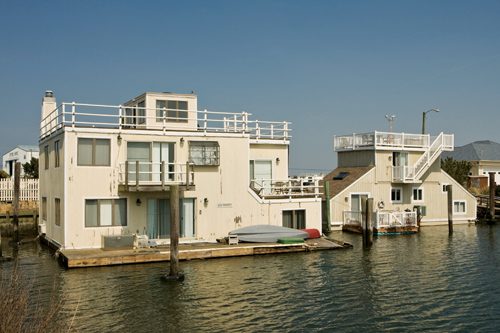
Is there such a thing as affordable housing on the New Jersey waterfront? Well, for as little as $150,000, you can own a house not just near the water, but on the water. Sea Village Marina, nestled in Great Egg Harbor near Margate, has 54 such floating domiciles.
The term houseboat is a little misleading. These cedar-shingled, framed structures are not navigable. They’re built on floating fiberglass hulls permanently moored to the dock. They do have all the comforts of home, like kitchens (with dishwashers and side-by-side refrigerator/freezers), and bathrooms with tubs and showers (and flushable toilets, as opposed to the traditional hand-pumped heads). Then there are wall-to-wall carpeting, central air conditioning, gas fireplaces, and best of all, windows letting in magnificent sunrises and sunsets.
These homes rock. Gently, but noticeably. Since they are registered as boats, they have to comply with Coast Guard regulations. “They all need life preservers, even though they never leave the dock,” says Bill Garry, general manager of Sea Village Marina.
Residents pay a monthly dockage fee of about $700—but no property taxes. If one of the homes comes up for sale—and they do, two or three times a year—the marina handles the sale, not a realtor. “They’re considered boats,” says Garry, “so they’re sold through us, as a boat dealer.”
Residents are a varied bunch. “There’s one guy who’s a captain on a freighter in the Middle East, one guy who’s a builder, another who works in a casino,” Garry says. “There’s a teacher. There’s all walks of life.”
Evelyn and Alvin Jacobs were among the first residents. The Upper Darby, Pennsylvania, couple bought their floating second home, the eleventh built in the development, “faster than I’d buy a pair of shoes,” says Evelyn, a dance instructor. Alvin, a math professor, when asked what’s best about houseboat living, says, “Let me read you a list.” In their top ten: catching and eating crabs, bird-watching, no shoveling snow or mowing lawns, paddling their paddleboat to visit neighbors, and “25 years of the most glorious sunsets.”
Many residents come for a respite and never leave. “I love it here,” says Libby Owen, who rented in Sea Village, fell in love with the life, bought a place two years ago, and has never looked back. Owen, a former resident of Sweet Water in Mullica Township, owns a preschool in nearby Egg Harbor. “My students think I’m a pirate. But where else can you fish out of your kitchen window?” Owen asks.
John Best III started Sea Village Marina in 1980 and built all 54 floating homes in four years. Expansion came to an abrupt halt in 1984 when New Jersey legislators outlawed floating homes. Sea Village was grandfathered in, making it the only floating community in the state. It’s a year-round mini-municipality that bustles during the summer. There are a clubhouse and a community pool, but most of the socializing is done dock to dock, across the narrow lagoons.
A typical floating home is split-level modernish, with a skylight, three bedrooms, and two baths—in a footprint of about 40 by 16 feet. Most have a topside deck that affords 360-degree views of marshland and the marina, Atlantic City, the Ocean City Ferris wheel, and the beaches of Margate.
Salt air is corrosive, requiring exteriors to be repainted more frequently than land-based homes. Otherwise, maintenance is minimal. “The fiberglass hulls get barnacles,” says Alvin Jacobs, “but that’s only an issue if you travel. These boats don’t go anywhere.” The homes have weathered many storms with nary an incident. “We’ve braced for storms—taping windows and cabinets—but nothing ever happens,” he says. The primary storm precaution is to make sure the lines are securely fastened to the docks. “We actually love storms,” adds Evelyn, “because then we get to feel the movement of the boat.”
It’s a peaceful existence; ducks, egrets, seagulls, and the occasional blue heron visit daily. “We’re always in touch with the tides and the moon and the weather,” says Owen.
Any drawbacks? The area needs dredging. At low tide the hulls are basically “sitting in mud,” says Garry. It’s a tricky situation, since the Department of Environmental Protection controls all permits for dredging. The marina is, however, slowly taking on that challenge.
Owens cites another drawback—if you can call it that: “I don’t get anything accomplished—it’s like being on vacation all year.”
Be sure to visit our Health & Wellness page.
